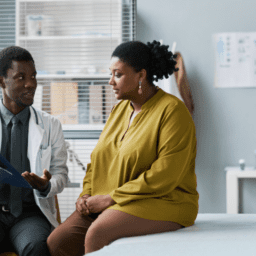In 1997, the first genetic cause of Parkinson’s was discovered. Since then, researchers have discovered more than 20 genes that cause Parkinson’s and multiple other genes that increase the risk that a person will develop Parkinson’s. Exactly how often these variants/mutations occur continues to be investigated. Rachel Paul, a Certified Genetic Counselor with Penn Medicine’s neurology department and Parkinson’s genetics research team, says that “overall, around 5-15% of people living with Parkinson’s are found to have a causal or risk-associated variant on genetic testing.” Paul also notes that “studies have shown that young onset Parkinson’s (YOPD) is more likely to be related to a genetic cause, even when there is only one person in the family living with YOPD. In contrast, Parkinson’s with a later age-of-onset is thought to be related to a more complex interaction of multiple factors such as age, genetics, environment, and/or other factors that researchers are still learning about.”
Because of the increased likelihood of genetic causes associated with YOPD and the fact that there are multiple benefits to having genetic testing and genetic counseling, specialists recommend that people living with YOPD consider these services.
The Basics of Genes and Genetic Testing
Humans have tens of thousands of genes. We inherit a copy of each gene from both of our parents, and each gene contains information that cells use to determine how, when, and where to build proteins. Genes convey this information to cells through specific sequences of chemicals in DNA.
Approximately 99% of chemical sequences in human genes are the same in every person, but every gene can have slight variations in its chemical sequences. Therefore, genetic testing evaluates the DNA sequences and detects variations.
Many genetic variants are considered normal and result in differences in physical traits. However, variants sometimes lead to poor functioning of cells. For example, some genetic variants cause the body to produce misshaped proteins. This happens when a gene instructs a cell to put the amino acids that comprise a protein in the wrong order. Misshaped proteins can accumulate in clumps and damage cells. Other genetic variants cause a particular cellular function to occur more or less often than it should. This can lead to higher levels of oxidative stress, which contributes to Parkinson’s by damaging neurons.
Genetic testing evaluates DNA sequences and detects variations. There are many types of genetic testing, and each test analyzes for different variations.
The Role of a Genetic Counselor
Genetic testing is a complicated and rapidly progressing science, and interpreting genetic test results is often highly nuanced. A genetic counselor can help you understand how genetic testing works, what you might learn from testing, and what you might do with what you learn. You can meet with a genetic counselor before and after receiving genetic testing.
During pre-test counseling, a genetic counselor helps ensure you understand the genetic testing process, the specifics of the tests you might receive, and what the results of the testing could be. Importantly, you don’t need to have plans to pursue any testing in order to receive pre-test counseling. A genetic counselor can also advise about additional testing that may be appropriate for you. Additionally, it can be helpful to have a genetic counselor on your care team because they can provide personalized updates as technology, research, and understanding of the influence of genetics on Parkinson’s continues to advance.
During post-test counseling, a genetic counselor will review the results of the testing you received, answer any questions you might have about the results—including questions about what your test results might mean for your family—and help you consider the next steps you might take.
Note that you might only be offered post-test genetic counseling when you schedule genetic testing. However, if you have questions before genetic testing, you can ask the person ordering the test to refer you to a genetic counselor for pre-test counseling. You can also find a genetic counselor independently through the National Society of Genetic Counselors and schedule an appointment.
Penetrance and Inheritance
Usually, YOPD caused by genetic factors occurs when a person has variants in both copies of a particular gene. This inheritance pattern is called autosomal recessive inheritance. One example is the gene PRKN, which is among the genes most commonly associated with YOPD. In other cases, YOPD can be caused by a variant found in only one copy of a gene. Examples include the genes GBA and LRRK2. This inheritance pattern is called autosomal dominant inheritance. Note that having a genetic variant does not necessarily mean that a person will develop Parkinson’s because variants in some genes associated with Parkinson’s have reduced penetrance. In genetics, penetrance describes the likelihood of developing symptoms when a genetic variant is present.
Autosomal recessive and autosomal dominant inheritance patterns have implications for family risk of Parkinson’s. It is important to understand that if a person has a genetic variant associated with Parkinson’s but does not have Parkinson’s, they can still pass on the variant and associated risk to their children. Because of this, the genetic testing you receive as a person living with Parkinson’s may be of interest to members of your family who do not have Parkinson’s but have the same genetic variants as you.
Because of the nuances of inheritance and the fact that different family members may have different perspectives on what they want to know about their genetic information, specific details about inheritance and the implications of your genetic test results for your family members should be discussed with a genetic counselor or another member of your care team. You want to respect everyone’s decision regarding what they do or do not want to know. That said, having pre-test genetic counseling can help you and your family understand what might be learned from testing before it occurs, and this can help minimize family tension and conflict.
The Benefits of Genetic Testing for People Living With YOPD
Although some researchers caution that our understanding of the influence of genetics on Parkinson’s is currently limited, the reasons for people living with YOPD to have genetic testing and counseling are still significant.
Understanding Symptoms, Progression, and Prognosis
Some genetic variants tend to affect the rate of progression and which symptoms a person is likely to experience.
For example, people with a particular LRRK2 variant tend to have a lower incidence of non-motor symptoms but a greater incidence of gait issues and postural instability. People with a PINK1 variant are likely to have slower progression and a lower incidence of cognitive impairment. Meanwhile, people with a GBA variant are likely to have faster progression and a greater incidence of cognitive impairment.
It is critical to recognize that the tendencies described above are not certainties, which is an important reason to consider meeting with a genetic counselor before and after genetic testing.
Better Assessment of Risks Related to DBS Surgery
Deep brain stimulation (DBS) surgery is often highly beneficial for people living with YOPD; however, some evidence suggests people with a GBA variant may be at greater risk of having cognitive issues following DBS surgery. In contrast, evidence indicates that people with a LRRK2 variant may be more likely to have better outcomes with DBS treatment. These correlations are still being researched, so sharing and reviewing your test results with your care team is important.
Access to Trials and Future Therapies
Knowing your genetic test results can help you know what clinical trials you can participate in. This is because some clinical trials are open only to people with particular genetic variants. Examples include trials focusing on gene therapy, an emerging therapy that aims to correct genetic variations.
Participating in a clinical trial is a great way to improve understanding of Parkinson’s, help develop new therapies, and continue progress toward a cure for Parkinson’s.
Knowing Why
Many people living with Parkinson’s wonder, “Why me?”
Genetic testing may answer this question, and for some people, this can be a source of relief. It is important to realize, however, that while people living with YOPD have a significantly higher incidence of genetic variants than people with later-onset Parkinson’s, most people living with YOPD will not test positive for a genetic variant known to cause Parkinson’s.
Understanding Additional Risks
Some genetic variants significantly increase the risk of a person developing Parkinson’s after exposure to particular environmental risk factors. These factors include exposure to certain pollutants and traumatic brain injury. Your genetic test results can help your family make informed choices about the risks they expose themselves to.
Genetic testing for Parkinson’s can also help you understand the risk that you and your family members may develop certain other health conditions. For example, most genetic testing for Parkinson’s examines the GBA gene, which is associated with Dementia with Lewy Bodies and autosomal recessive Gaucher Disease.
Note that some adult family members may want to know their genetic information and associated future or reproductive risks, while others may not. Talking with a genetic counselor can help navigate these issues.
Help with Family Planning
If you have a genetic variant associated with Parkinson’s and you (or your family members) are considering having children, your physician or genetic counselor can review what the potential risk would be for children based on your genetic testing results. They may also help you consider whether preimplantation genetic testing or other family planning options may be appropriate for you and your family.
How to Access Genetic Testing
There are multiple ways to access genetic testing. One option is that multiple companies offer direct-to-consumer (DTC) genetic testing. You can order tests through these companies, and some even have dedicated products focusing on Parkinson’s genes. Another option is to have testing ordered by your movement disorder specialist, neurologist, or another care team member. A third option is to have genetic testing through a clinical trial. Two ongoing clinical trial options are PDGENEration and a trial at the NIH. These trials provide high-quality testing and post-test genetic counseling at no cost to participants.
Differences Between Testing Options
There are significant differences between the three testing options described above, and this is one reason why it can be important to talk with a genetic counselor or your physician before pursuing testing: they can help you ensure the testing you receive is appropriate to your interests, circumstances, and motivation for testing.
Differences between the testing options include:
Genes and Variants Tested
Different genetic tests often examine different genes for variants. Most genetic testing for Parkinson’s will examine a predetermined set or “panel” of genes. Some panels test just a few genes, while others include a few dozen genes, and clinical trials may even offer genome testing to some participants.
Regarding the significance of differences between testing options, Paul says, “For YOPD, a very important difference is that many genetic tests for Parkinson’s in DTC testing services and/or research studies are not designed to include a comprehensive analysis of all relevant genes in YOPD. One example is that many tests for Parkinson’s may not include any analysis of the YOPD-specific gene PRKN. If you have questions about which gene(s) may be covered on your testing, you could discuss this with a genetic counselor or your healthcare provider.”
Moreover, different genetic tests may also examine different parts within the genes listed on the test. On this point, Paul says, “Many tests for Parkinson’s may not be designed to analyze the entire gene(s) listed for the test. In other words, some tests are designed to search for only the most common variant within the gene(s) listed and will not look at the rest of the gene.”
There are often other technical differences between the clinical-grade tests ordered through a medical provider and those ordered from a research study or DTC service. Accordingly, significant DTC and research-based test results should be confirmed with clinical-grade testing.
Costs
Genetic testing and counseling you receive as part of a clinical trial will be free, but if your testing is ordered outside of clinical trial by a physician, a genetic counselor, or through a DTC service, your out-of-pocket expenses will vary.
If you are paying for testing without insurance, the costs range from approximately $250 to over $1500. Fees for genetic counseling also vary.
Availability of Genetic Counselors
In DTC testing and some research studies for Parkinson’s, genetic counseling may be available only after testing is completed. If you access testing through one of your care providers, their office may have a genetic counselor available or may be able to provide a referral to a genetic counselor.
Looking Forward to the Future
As research continues and our understanding of the influence of genetics on Parkinson’s increases, the information you gain from genetic testing today will become even more helpful to you in the future.
Moreover, many researchers acknowledge that there is limited data about the YOPD population, and when you have genetic testing through a clinical trial, you will help advance your understanding of the influence of genetics on YOPD.
The more information researchers have about the YOPD community, the more focused future studies can be, which will accelerate the development of new treatments and help improve the lives of people with YOPD.
Special thanks to Rachel Paul, MS, CGC, for contributing to this post.
WANT MORE PRACTICAL ARTICLES LIKE THIS?
You can learn much more about living well with Parkinson’s today through our Every Victory Counts® suite of resources. Each manual is packed with up-to-date information about everything Parkinson’s. Click the link below to reserve your manual(s).

















